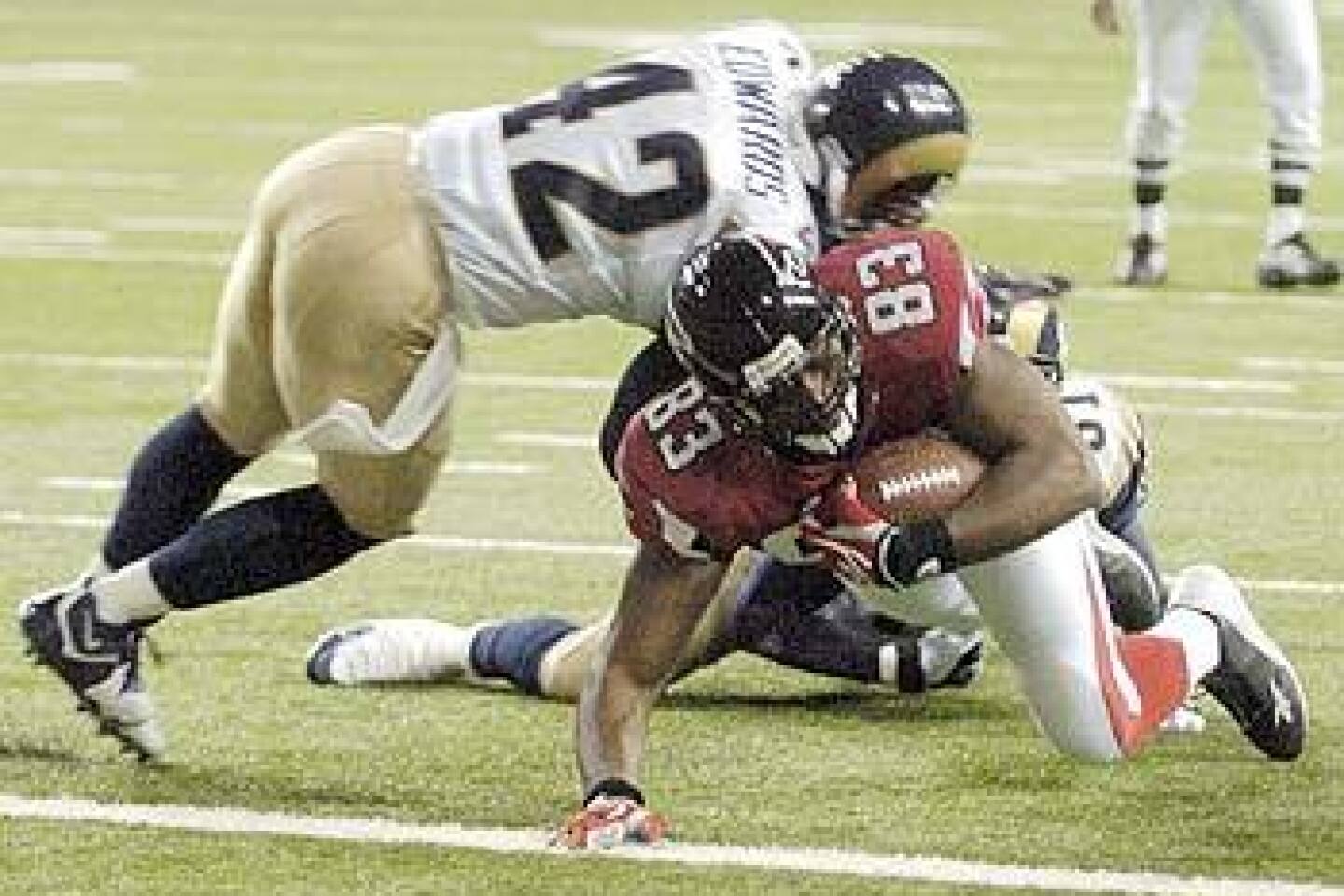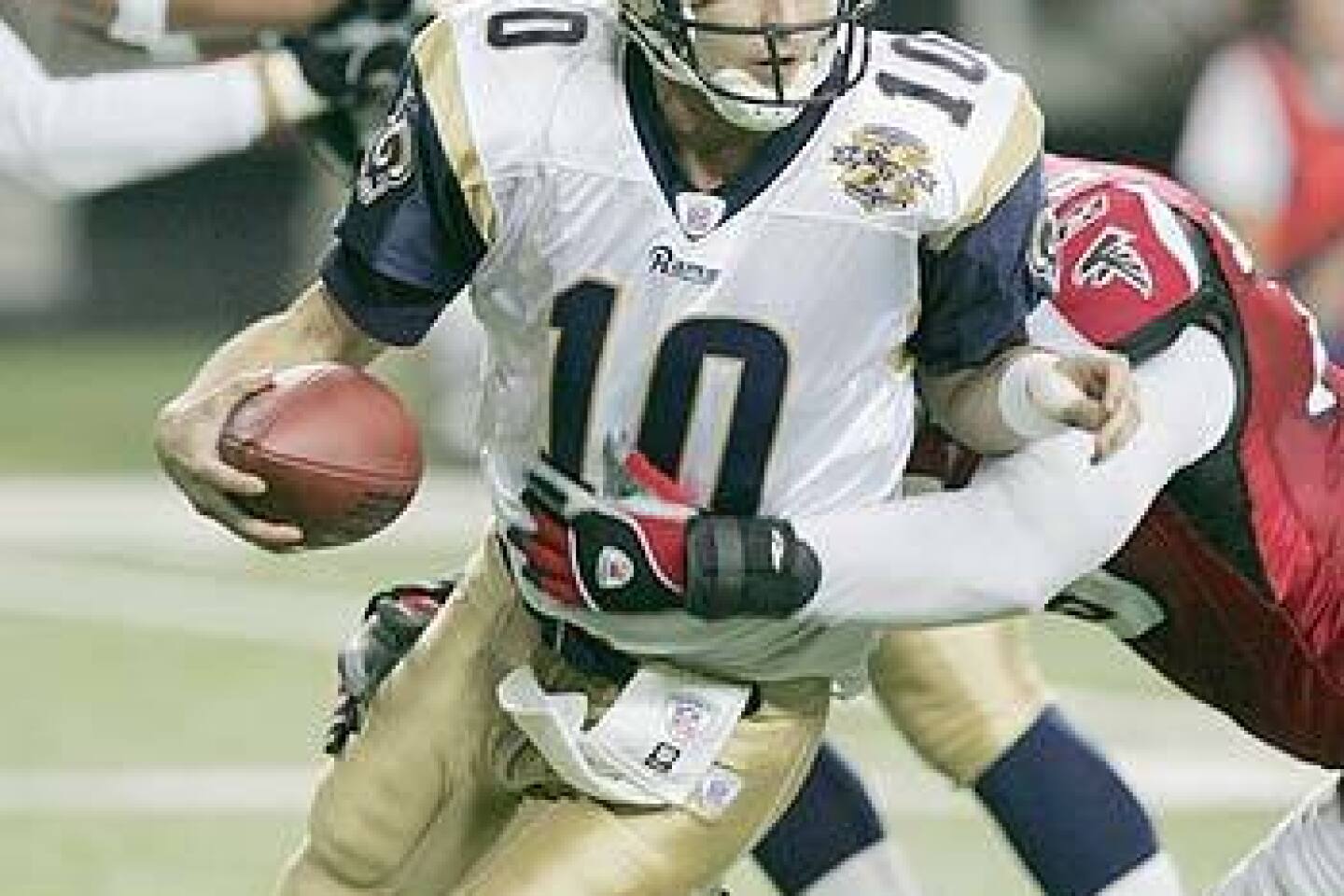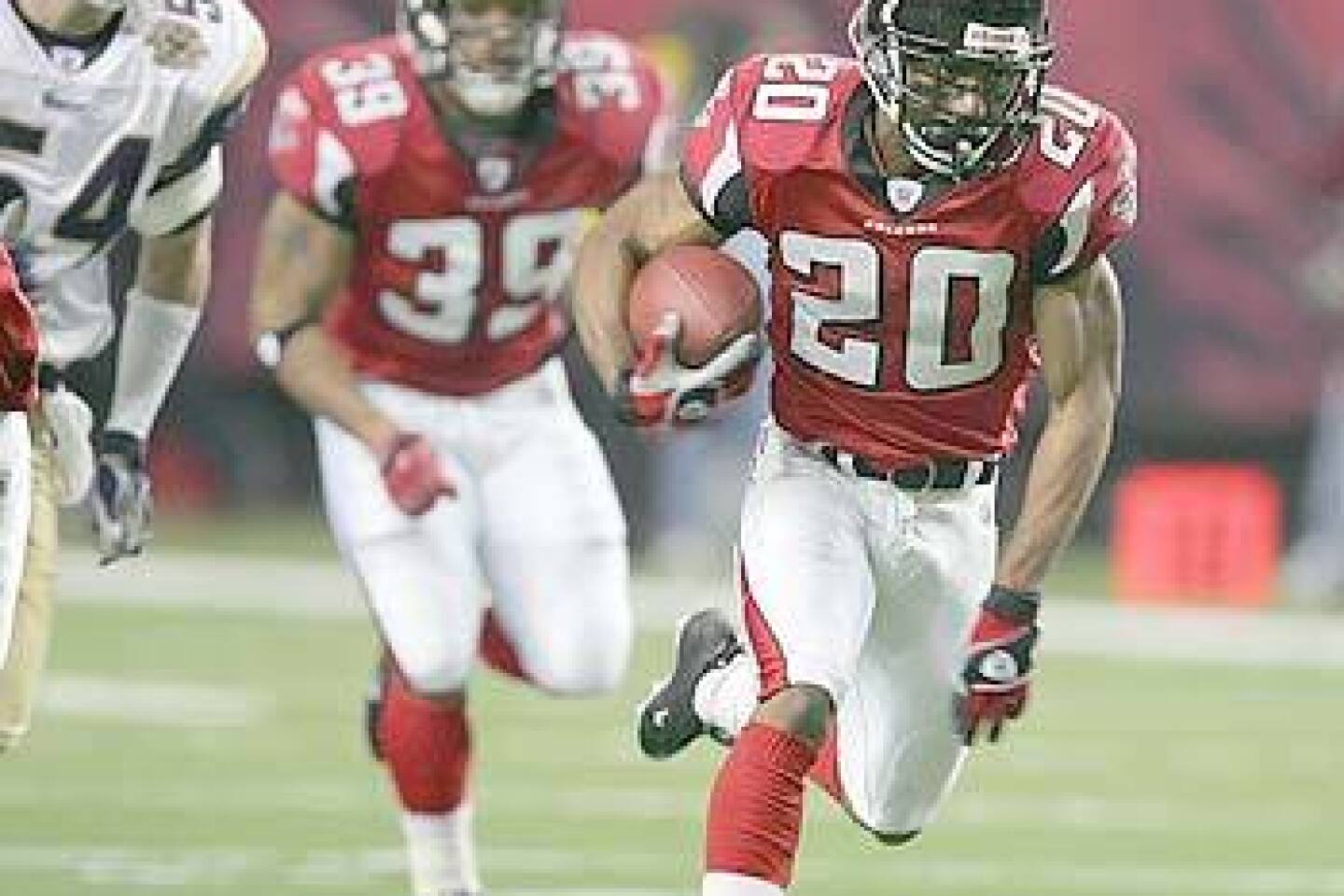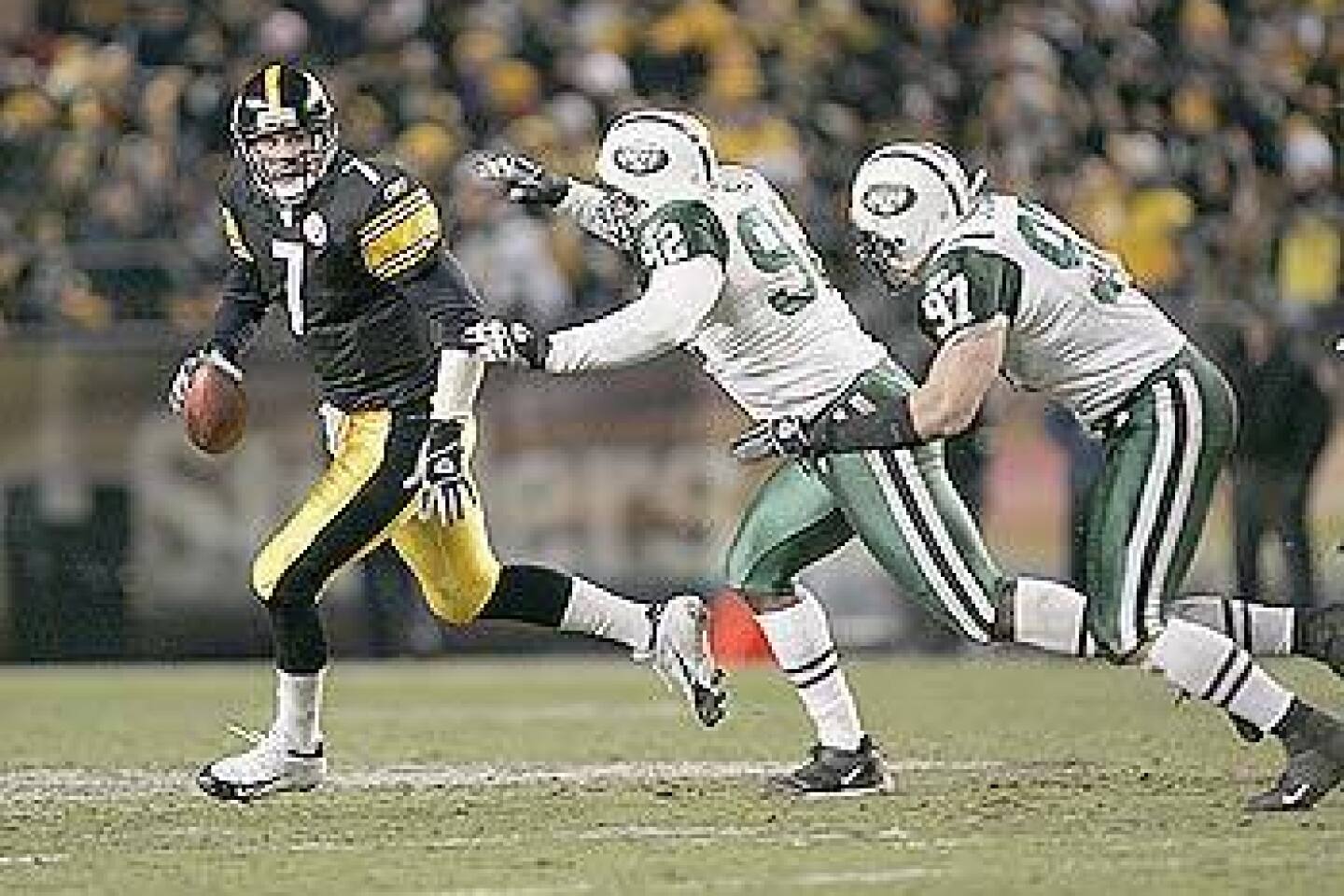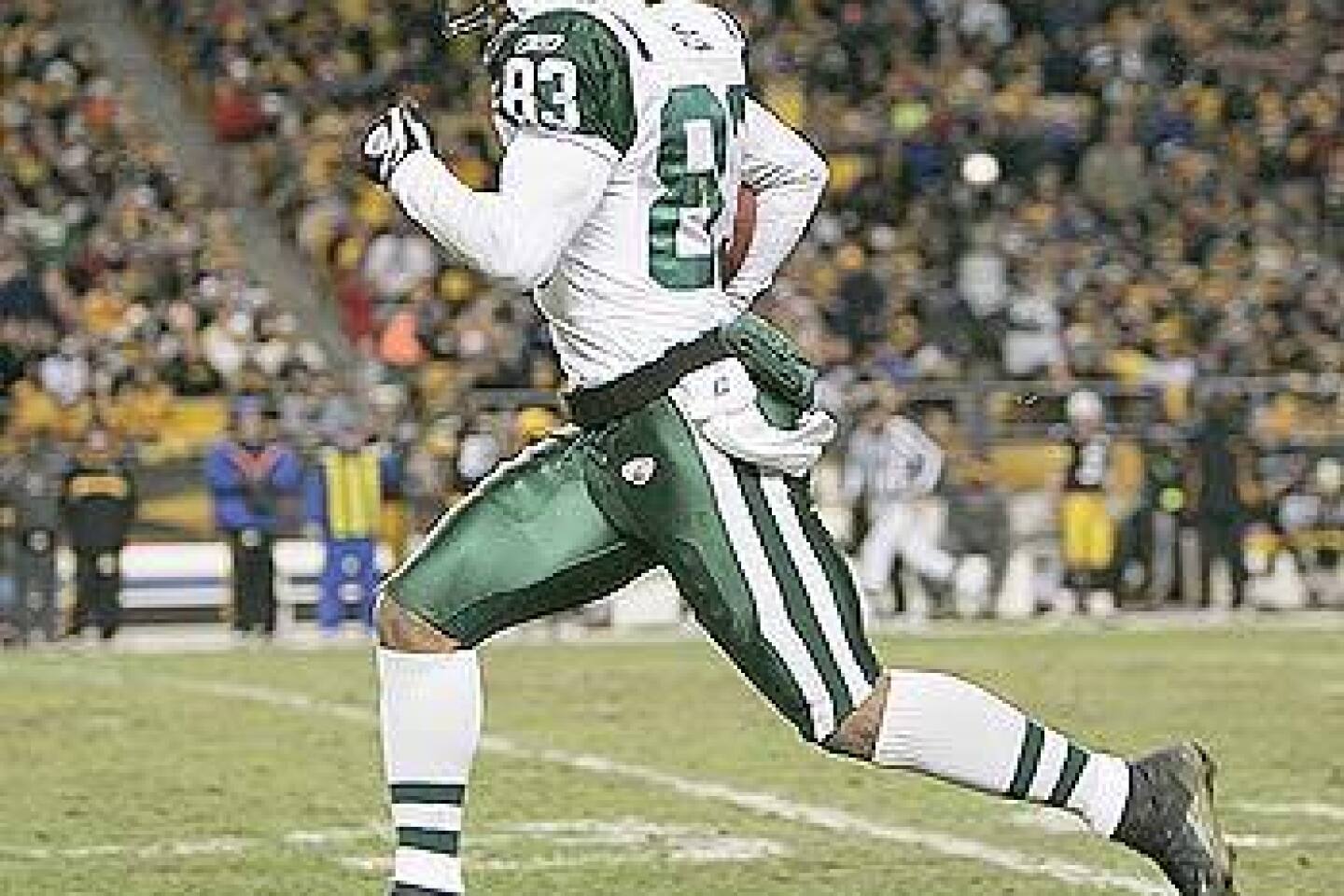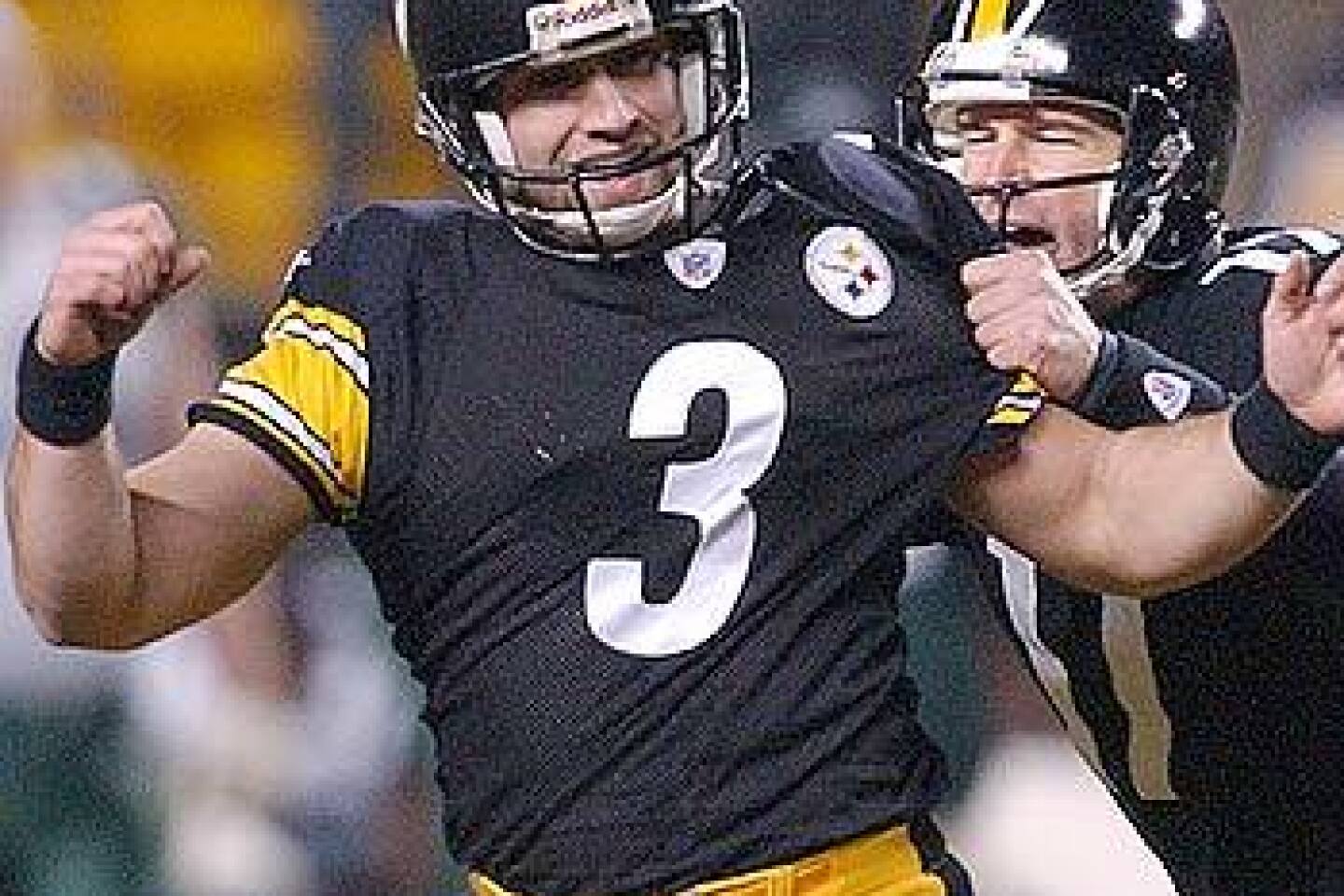Manning Beats Himself
- Share via
When the season began last September, the NFL’s two best teams seemed to be the New England Patriots and Philadelphia Eagles — the best, at least, in their own conferences — and nothing happened in Sunday’s doubleheader to shake the perception that they’re both still on the way to Super Bowl XXXIX.
Although Pittsburgh won the home-field advantage for this week’s AFC title game, the Patriots will be there with the wilier coach, Bill Belichick, and the more mature quarterback, Tom Brady, who each own a 2-0 edge in Super Bowl games won over Pittsburgh’s coach, Bill Cowher, and quarterback, Ben Roethlisberger.
As for Atlanta and Michael Vick, their season figures to end this week in Philadelphia.
It was no surprise Sunday that the Patriots and Eagles won from the Colts, 20-3, and Vikings, 27-14.
But the football public was stunned that Colt passer Peyton Manning was shut down. The explanation, once more, is that Manning is both a great passer and a bad quarterback. Allowed to call many Colt plays, he shared the snaps with Edgerrin James while the game was on the line, reasoning, incorrectly, that he needed James’ runs to set up his passing. Actually, all Manning needed was an occasional James run along with a few fakes and many, many more passes, particularly on first down. Manning, the world’s greatest passer, doesn’t see that, doesn’t get it. His is the football mystery story of the year.
Peyton Plays Into Belichick’s Hands
PATRIOT LEADER BELICHICK takes his place now as the NFL’s most dominating coach since Bill Walsh (who in the 1980s built the Super Bowl’s only five-time winner) and among the three most dominating coaches since Knute Rockne. (The other is 1960s champion Vince Lombardi.)
Belichick, however, couldn’t have done it Sunday if Manning hadn’t played into his hands with a pathetic, predictable offense.
Although first down is by far the best passing down against Belichick, or any other NFL defensive genius, it was only in the last two minutes of the first half that Manning, directing the Colts’ 11-play, 67-yard field-goal drive, threw the ball on every first-down play and, indeed, on every play but one.
In no other series that day did Manning relentlessly move the Colts along, for, on every other series, he kept trying to involve running back James. In all the time before the score rose to 20-3 halfway through the fourth quarter, Manning was a passer on only three of the Colts’14 first-down plays. On 11 of the 14, any junior college quarterback could have done what Manning did: hand the football off. And after all the time Manning wasted stretching out to hand his tailback the ball, James gained a total of 39 yards.
Even more revealing, Manning, in the third quarter, gave his side no chance whatever. As the game slipped away, the Colts, with the NFL’s best passing team and one of the best ever, continued to run every time they had a first-down call in the third quarter — four times — and threw it on every second-down play. In other words, Manning blessed Belichick with the most predictable possible offense.
Colts’ Game Plan Lacking in Smarts
THE SIGNIFICANCE of first down is that it’s the one down when every defensive expert, Belichick included, must be prepared for run and pass both — even when he realizes that one or the other is probable. Thus, first and 10 is the best of times to throw.
On third and five or 10 — as defensive coordinators all know — every man, woman and child in the stadium can predict pass.
Arithmetically, the problem with a first-down run is that even when it gains seven or eight yards, a pass play could have gained 15 or 20 yards or more. That’s the root argument in favor of passing over running: A successful pass advances a good offensive team closer to the touchdown line than does a successful run.
When running teams spring a ballcarrier for 100 or 150 yards in one afternoon — as Indianapolis and Pittsburgh so often do — they simply aren’t passing often enough to produce the several more touchdowns they could expect with, say, a 300-yard passing day.
Nonetheless, in Foxboro as usual, the Colts’ foolish, run-based offense somehow pleased their offensive coordinator Tom Moore. Either that or Moore doesn’t have the will or know-how to change it
The Shaughnessy-Belichick Defense
THE CONVENTIONAL explanation for Manning’s many defeats in New England is, of course, partially true: In New England, he keeps bumping into the best defensive coach of his time.
In this game, the Belichick defense was based on continual pre-snap movement to disguise Patriot intentions and change up the defensive look.
The inventor of modern moving defenses was mid-20th-century coach Clark Shaughnessy, who also invented modern offense. For those two achievements, he clearly belongs in the Hall of Fame, but isn’t, and that’s another story. This week’s story is that Shaughnessy’s defense was taken to a new high by Belichick, who wielded it to beat the best passer of his time.
Even so, had Manning called an intelligent game — as he did against Denver recently when he passed on most downs to rout the Broncos, 49-24 — Belichick loses. To beat Belichick, Manning merely ignores Belichick’s jumping-around defense — and forgets that Belichick’s people intercepted him four times a year ago — and throws the ball as only he can throw it. Why not? Why not dictate to Belichick instead of giving him that delight?
The embarrassing thing to the Colts is that injuries had removed Belichick’s best defensive player, Richard Seymour, as well as his two starting cornerbacks, and Belichick still won. Against Manning’s team, what could be worse than losing both starting cornerbacks? Why let Belichick jump around to disguise the obvious truth that he wants you to run? Embarrassing.
Big Ben is Still the Best
THE QUARTERBACK who has it toughest this month is Roethlisberger, who is being asked to line up Pittsburgh’s old-time offense, the most out-of-date offense in the league, and use it to win playoff games. Still, when he so narrowly beat the New York Jets in overtime Saturday, 20-17, it was instantly assumed, and announced, that Big Ben “finally played like a rookie.”
That’s a libel on Roethlisberger, who under the circumstances played another great game, his 14th straight in an undefeated NFL career. Whereas the Jets could only score touchdowns on long returns (a punt run and an interception return), Roethlisberger beat them this way:
In the tensions of a fourth quarter when Pittsburgh was clearly losing (17-10), he coolly directed the only sustained long touchdown drive of the game to tie the score. He opened that 66-yard drive with a 20-yard scramble and ended it with a four-yard shovel pass. In between he successfully did what any quarterback employed by any conservative, old-fashioned team must do, he completed third-down passes.
In overtime, Roethlisberger outdid his remarkable fourth-quarter performance. After his defense got him the ball on the Pittsburgh 15, he moved the Steeler offense 72 yards to the winning field goal, passing successfully on third and six and third and five, then passing carefully in the red zone.
For an NFL rookie in his first playoff game, it was a magical, all but unbelievable afternoon, for which, unbelievably, he was castigated afterward for completing only 17 of 30 passes and for throwing two interceptions — for, in other words, being “a rookie who finally played like a rookie.” Not much could be further from the truth.
If Roethlisberger fails to win his 15th in a row this week, it won’t be because he’s a rookie playing like a rookie but because his coaches have failed to structure an offense that matches the brilliance of their defense. Asking a rookie like Roethlisberger — or a veteran like Manning — to complete third-down passes against Belichick is like asking a rock star to sing opera.
Can Unorthodox Falcons Win a Big Game?
THE ATLANTA FALCONS, who destroyed the Rams Saturday, 47-l7, could win again in Philadelphia this week with their field leader, wild-man runner Michael Vick , who is an unprecedented kind of quarterback and the most unpredictable athlete in the league. The Falcons are a team whose good running game is set up not by passer Vick (which is an acceptable NFL way) but by scrambler Vick. If that isn’t sufficient this time, the reason will be obvious: Vick isn’t enough passer to last any longer in the playoffs.
There is only one challenge to the Eagles this week — defensing Vick wisely, properly — and the Eagle leader with that assignment is Jim Johnson. An upper-echelon defensive coach, Johnson, who’s kept most of Philadelphia’s opponents at bay throughout the century, has helped Coach Andy Reid reach four consecutive NFC championship games.
The Rams, meantime, are out of the playoffs because their defensive team and their special teams have all deteriorated alarmingly during the five-year tenure of Coach Mike Martz, whose expertise seems to be limited to play design — a specialty in which he has perhaps never had a peer.
The Minnesota Vikings are out of the playoffs because, at Philadelphia Sunday, their coaches cost them all chance with a needlessly complex game plan that made a needlessly tentative threat out of a great passing-running quarterback, Daunte Culpepper.
More to Read
Go beyond the scoreboard
Get the latest on L.A.'s teams in the daily Sports Report newsletter.
You may occasionally receive promotional content from the Los Angeles Times.
